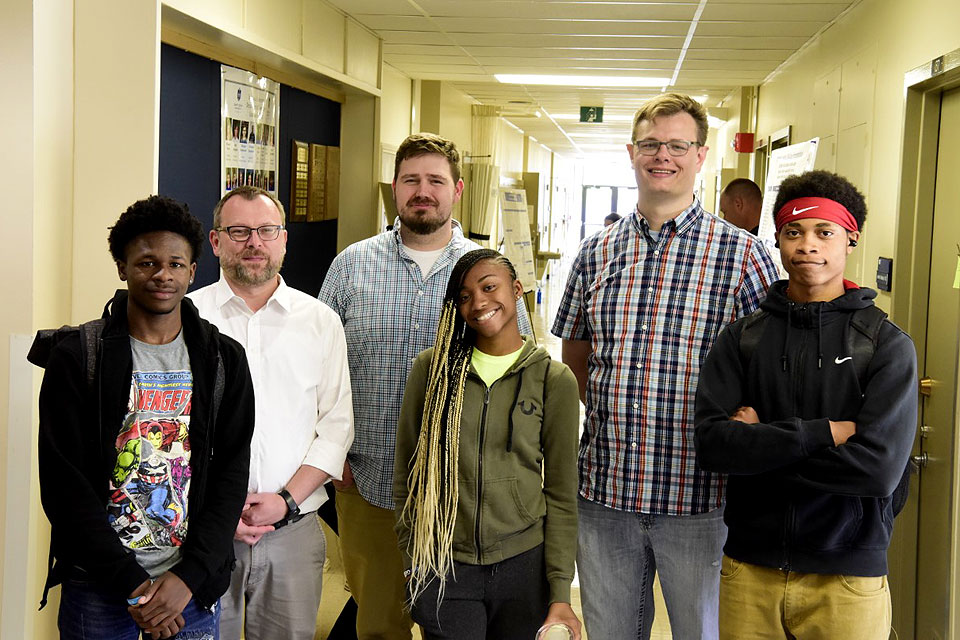Planting SEEDs for Change: Chemistry Summer Research Experiences Open Doors to Future Researchers
Through a grant-funded partnership with the American Chemical Society (ACS), scientists from Saint Louis University’s Department of Chemistry are bringing young minds into the lab, providing opportunities for them to gain skills and to look ahead at possible paths into the scientific workforce.
As part of the ACS SEED program, SLU scientists mentor high school students from economically distressed areas during summer research experiences. The partnership is marking its fifth year, and 11 students have worked in SLU labs to date.
Increasing participation in the scientific workforce from all sectors of society has been an important issue for the U.S. as global competition necessitates that countries take advantage of all the natural talent in their populations.
The SEED program’s emphasis on leveling path to enter science across economic backgrounds is newly urgent, according to Ryan McCulla, Ph.D., associate professor of chemistry and SLU SEED program coordinator. Access to scientific and STEM opportunities often carries a high price tag, McCulla explained.
“There are many opportunities in science for youth if you are able to pay,” McCulla said. “Programs like ACS SEED are pushing against this problem. The existential challenges faced by the world require us to harness all available talent by making sure science is an inclusive field.”
The SEED program is one of the ways SLU’s chemistry department has sought to bring the marvels of reactions, catalysis and synthesis to a wide array of young scientists. Partnerships and joint projects with public school including the St. Louis Public Schools’ Clyde C. Miller Career Academy, Jennings High School in north St. Louis County, and Dupo High School in Dupo, Illinois, bring SLU scientists into the classroom and high school students into University labs.
The existential challenges faced by the world require us to harness all available talent by making sure science is an inclusive field.”
Ryan McCulla, Ph.D., SLU SEED program coordinator
These partnerships also introduce students to the broader chemical community as many of the partnerships are supported by external partners including Bayer, The United Way, and Jost Chemical.
During SEED research experiences, students like Gayla Fields and Eli Robinson, both seniors at Jennings High School trained with SLU faculty mentors and assisted them in advancing research projects ranging from the computational investigation of reaction mechanisms to the synthesis of new potential cancer drugs.
"Before this program I knew chemistry wasn’t simple, but I would have never realized how complex it was without this program,” Fields said.
Fields worked to assemble a library on compounds to screen for biological activity, requiring her to run a series of chemical analyses, and Robinson and Fields also tried their hands at running biological assays.
In the past, students have also inputted files for geometry optimizations, transition state searches and frequency calculations among other tasks.
SEED mentee Ezarion Grant, a senior at Jennings High School, said he felt he didn’t have a deep background in chemistry before spending his summer in a SLU lab. After participating in the program, he said the skills he learned would carry through the skills he’s acquired into his life beyond the lab.
Robinson has been inspired to consider a career path utilizing chemistry, likening his experience in the lab to spending time with family.
In addition to gaining valuable research experience to leverage during collegiate admissions, students also receive stipends so they can focus on their research while still preparing for their futures.
McCulla said that the program is providing a key opportunity to students who might not otherwise be able to participate in science at this level so early in their educational journeys.
“As program coordinator, I am truly thankful to the ACS SEED and the donors to this program,” McCulla said. “With their support, young scientists are able to pursue their passion when their current economics could otherwise prevent them from participating in this type of immersive experience.”
For more information about the program, contact Ryan McCulla, Ph.D.


















